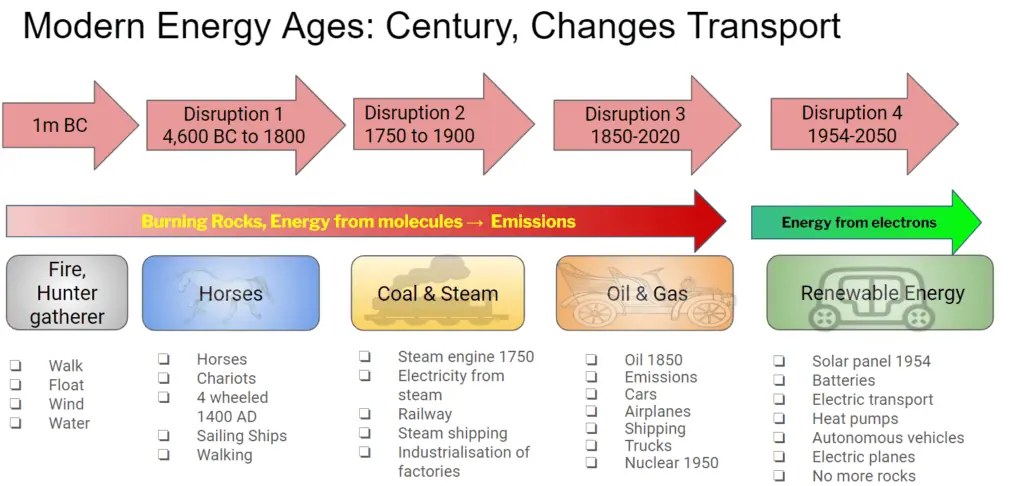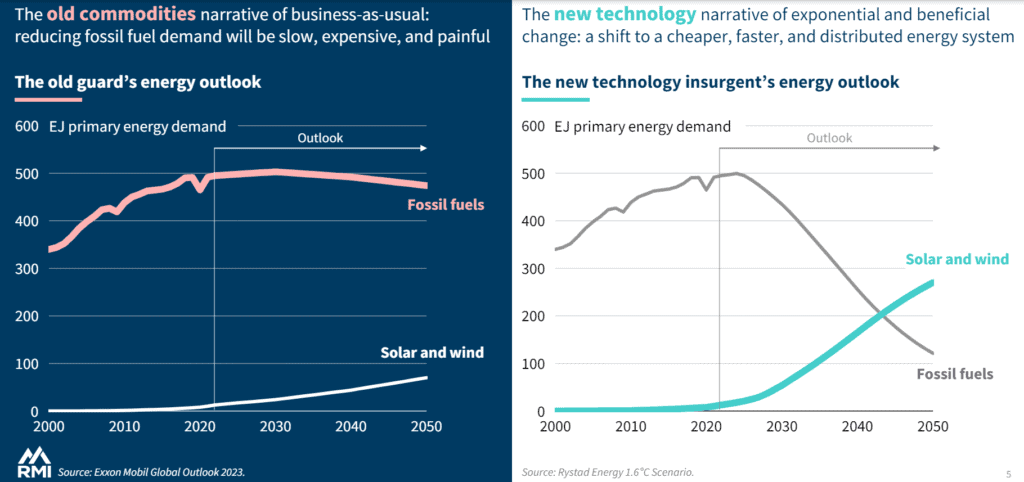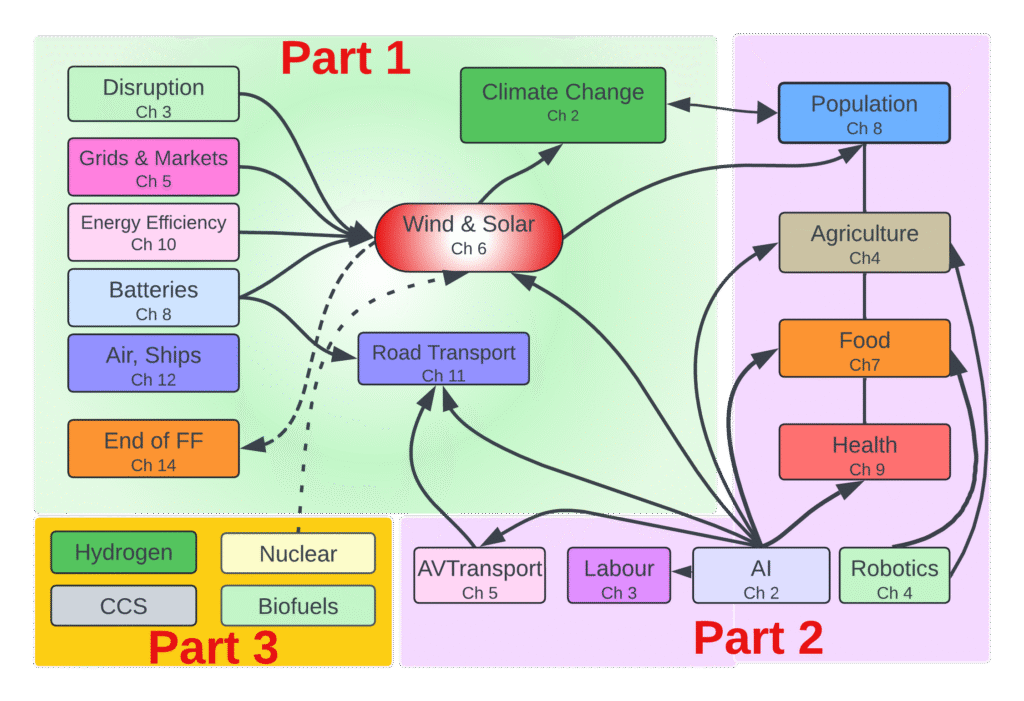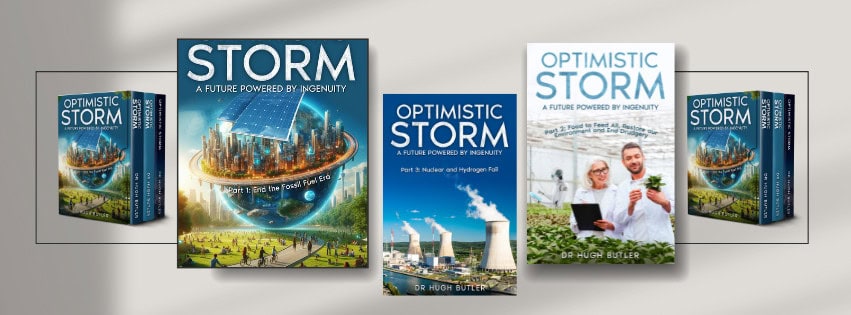Optimistic Storm: A future powered by Ingenuity. The end of the fossil fuel era is the title of my latest book. Innovation is changing our world faster than imaginable, commercialising innovative technologies faster than most people realise. Disruption is the result of multiple new technologies and new business models. Check out some of the over 250 articles on energy disruption, transportation, food and agriculture.
Change comes from prosperity. We can be optimistic.
Optimistic Storm books – 3 Parts
- Part 1: End of the Fossil Fuel Era, Energy and Transportation Edition 2
- Part 2: AI. Food to Feed all, Better Health, End Drudgery, and Restore our Environment and End Drudgery
- Part 3: Nuclear, Hydrogen and Other Tech Fails
Buy ebooks or paperbacks directly on Amazon Kindle or purchase below directly from the author. Availble in all formats.
- E-book – Epub or Kindle
- Paperback
- Audio
4th Disruption. End of Fossil Fuel Era
For a million years we used our muscles (Era1). We discovered coal and steam (era 2) and the world became closer. Era 3 of gas and oil gave us planes and cars. Now we are in Era 4 and no longer need to burn 300 years of carbon molecules but instead capture just 1.5 hours of electrons from sunlight.

Blog Posts – Recent
Scroll through the articles, or the full list is in the footer. Down there at the bottom ↓↓
- Everything Electric UK 2025
 At Everything Electric UK 2025, pushed as both car and house, the house energy was very subdued. Most of the show where new EVs into UK. From Hyundai, to BYD, Geely, GWM, and Zeckr there are Chinese cars gallore. Octipus had a range of dozens of cars to suit lease with free charging.
At Everything Electric UK 2025, pushed as both car and house, the house energy was very subdued. Most of the show where new EVs into UK. From Hyundai, to BYD, Geely, GWM, and Zeckr there are Chinese cars gallore. Octipus had a range of dozens of cars to suit lease with free charging. - Deep-sea Mining
 Deep-sea mineral mining is a proposed industry that aims to extract valuable minerals from the ocean floor. While it offers potential benefits for meeting the growing global demand for metals, it also poses significant environmental risk. The pros and cons are shown to provie little benefit to the supply of minerals but the money speaks. More destruction likelu
Deep-sea mineral mining is a proposed industry that aims to extract valuable minerals from the ocean floor. While it offers potential benefits for meeting the growing global demand for metals, it also poses significant environmental risk. The pros and cons are shown to provie little benefit to the supply of minerals but the money speaks. More destruction likelu - Actor Network Theory and Hydrogen
 Actor network theory or ANT described by Bruno Latour can be used to understand why the world thought hydrogen was a critical part of carbon emissions reduction to mitigate climate change. Turns out that the black box of Hydrogen is a myth. Based on faulty science, supported by subsidies to support existing fossil fuel companies. Thankfully is dying as the box is exposed.
Actor network theory or ANT described by Bruno Latour can be used to understand why the world thought hydrogen was a critical part of carbon emissions reduction to mitigate climate change. Turns out that the black box of Hydrogen is a myth. Based on faulty science, supported by subsidies to support existing fossil fuel companies. Thankfully is dying as the box is exposed.
Why Optimistic Storm? Because change management relies on four core principles which are :
- Understand Change.
- Plan Change.
- Implement Change.
- Communicate Change.
Change is happening rapidly. Climate change. Renewable energy. Transportation. This period of human existence is one of the great revolutions of the last 20,000 years, and the changes will be as or more profound as previous revolutions. These are somewhat different to the energy transitions.
- First Industrial Revolution 1765
- Second Industrial Revolution 1870.
- Third Industrial Revolution 1969.
- Four – Multiple – End of Fossil Fuel, Food for All, End of Work
This will be more profound than previous. It is the end of the fossil fuel era, with the rise of renewable energy and spell the end of individual ownership of cars to a public transport system on demand. The disruption in food will spell the biggest change to agriculture since the dawn of agriculture. The rise of robots will spell the end of dangerous, dirty and drudgery toil.
Commercialising Innovative Technologies
About 20 years ago, an astute Canadian told me there are 3 reasons people change.
- They make money
- They lose money
- It is the law
The strongest change is when there are 2 factors in play. So change can be sudden. Whenever something is 1/10th of the cost, change will happen. Adoption is often 10 years to get to 1% of the market. Then within a decade, it can hold 80% of the market. Often it is not a 1 to 1 substitution.
Article Perspectives
Check out the various recent blogs. I try to view these subjects from 3 perspectives.
- Technology. Does it work? We know that R&D and scaling of solution will drive up the tech, and decrease costs
- Economics. Are the compelling financial or economic drivers for change? Will these change with R&D or scaling?
- Politics. What are the institutional barriers or the individuals belief systems?
Innovation is never a straight line. And forecasts are often wrong.

Challenges to Transition
The International Energy Agency says the data shows a looming mismatch between the world’s strengthened climate ambitions and the availability of critical minerals that are essential to realising those ambitions. This in the energy market is also true to other aspects of change over the next 10 years.
Part 2: AI – Food to feed all, Restore Our Environment, Better Health, and end Drudgery
- AI is driving change across multiple sectors.
- In the white-collar or knowledge worker labour market.
- In the blue-collar and robotics AI will end drudgery
- AI is enabling change in food
- AI and multi-omics are driving changes for better health.
- We will have abundance of food
- We no longer need to farm most of our animals. We won’t need to kill 1,000 animals for every human on the file.
- These changes enable regreening the earth and come back from the edge of disaster from climate change.
This book is available now, provides optimism in multiple sectors.
Part 3: Hydrogen and Nuclear Fail
In Part 1 and Part 2 we see innovations that disrupt our society. Some innovations fail to progress. They either are part of the old era (nuclear) or have been thought to part of the new era, but fail either on technology, economic or social reasons. That is in Part 3. All three parts are in print, e-book, paperback and audible (Spotify)


